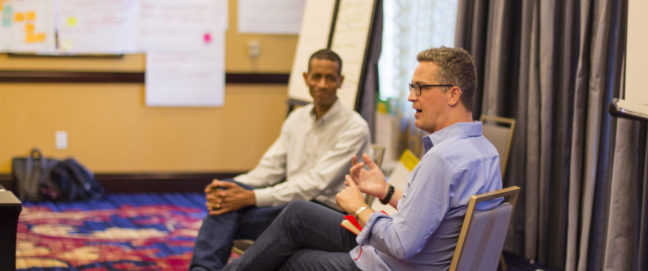Foundations have traditionally been shy about engaging with public authorities and lobbying decision-makers. Ironically, believes Alberto Alemanno, one of the effects is that philanthropy has indirectly contributed to the social divisions it often aspires to heal. Speaking to Alliance at Dafne’s recent PEXforum2020 in Madrid, he tells Charles Keidan that it’s time for philanthropy to roll up its sleeves.

Good Lobby’s Alberto Alemanno discussed advocacy and lobbying at PEXfourm2020 earlier this year.
You note three areas of focus in the relationship between philanthropy and advocacy. Can you talk us through them?
Philanthropy and advocacy meet in at least three different scenarios. The first area is philanthropy speaking on behalf of the sector to defend and promote its own interests with decision-makers. A second area is where individual philanthropic organisations embrace the policy aspects of certain causes, which often involves using philanthropic networks to form coalitions. The third scenario – probably the least discussed – is philanthropic grantmaking in support of advocacy. So these are the three major advocacy scenarios and the level of engagement of the philanthropic sector with each of them varies depending on context – geography, local culture and so on. Needless to say, in the US, the advocacy element of the philanthropic sector is more developed than in Europe, where the political turn of the philanthropic sector is just beginning to be discussed. This is very much driven by the fact that more and more philanthropies want to engage, they want to speak with one voice for the sector, especially when it comes to the possibility of building a single market for philanthropy in Europe.
And is your view that all three of those areas are worth pursuing?
I think there is room for more philanthropic engagement with advocacy for the very simple reason that advocacy is one of the most powerful ways to induce social change. More and more foundations like to define themselves as social change agents, so I find it paradoxical that they forfeit their right to advocate on behalf of the sector, on behalf of a policy, and to enable other people, notably their grantees, to do so.
Why do you think that is?
There are a variety of reasons why philanthropies have been reticent about advocacy and more specifically lobbying. The first one is cultural. Mostly people think that lobbying is a dirty business. Why should philanthropies and NGOs which pursue public interest causes get their hands dirty and do what corporations do in order to pursue private interest? A second reason is that lobbying has de facto been pretty much hijacked by corporate interests. And then you have legal constraints, with different rules in different jurisdictions covering the level of engagement of non-profits and philanthropies with a political process.
Why do you think it’s been easier for corporates to lobby than for philanthropy or non-profits?
The logic of collective action tells us that it is much easier to organise around private interests that affect a few, than it is to organise on behalf of the general interest. But the actual problem of today is access to power. Who enjoys access to decision-makers today? When we look at data, we see at the European level, that 75 per cent of the meetings decision-makers have are with corporations. So, in a way, civil society including philanthropies have given up that role, despite the fact that talking to politicians and trying to voice their concerns is a legitimate activity. Paradoxically, by becoming more cautious in their political engagement, foundations have assisted in the stratification of society by amplifying the voice of the few, in the form of corporations.

‘I think lobbying has to be democratised, meaning that it should be made accessible to more actors. This would be in the best interests of society…’
Did you set up the Good Lobby in the hope of shifting that balance?
That’s correct. I started the Good Lobby five years ago with the conviction that the only way to offset the excessive influence of corporate political power is to incentivise, support and channel a greater number of voices into the political process. We do so by upscaling civil society advocacy skills, but also by amplifying their voice through other forms of support and campaigning. Among the policy ideas that I’ve been advocating and to which philanthropy could contribute, is the idea of lobbying aid. In every single jurisdiction, we have legal aid. When an individual cannot afford access to justice, a lawyer is assigned to take up their case. Why don’t we do the same in the lobbying space? When civil society organisations advocate for a cause which is constitutional, they’re not crossing any red lines, yet they do not receive support to enable those voices to be present.
So is your vision to democratise lobbying, to broaden the base beyond large corporations which are primarily pursuing their business interests?
Correct. I think lobbying has to be democratised, meaning that it should be made accessible to more actors. This would be in the best interests of society, including corporations, because decision-makers would have the benefit of many more views, those of the so-called missing stakeholders and this would also offset the undue influence of other voices. But in order to democratise we need to first demystify what lobbying is about. We’re talking about the constitutional right that every individual has in any democracy to petition government, to speak to his or her own representatives. But for this demystification to occur, we need funding, we need experimentation that might allow for instance a philanthropy to pilot a particular policy option through different NGOs – it might be universal basic income, or it might be taxation on some particular products or activities – and to see how it would work. The experience gathered from such experiments could then be presented to a political leader who, acting as a political entrepreneur, might incorporate it into his or her own political agenda. Yet neither philanthropies nor their grantees are good at agenda-setting.
I think we need more serious engagement, a more serious conversation about how philanthropy can engage in the advocacy space, and about how this should be accompanied by clear accountability mechanisms
Is there a risk that, in allowing or encouraging philanthropy to pursue that experimentation role, you replace excessive corporate influence with excessive philanthropic influence?
Some clear regulatory framework is required to differentiate corporate and philanthropic lobbying power. But once you have this distinction, there is a pluralist argument for philanthropic support of a greater number of civic voices. The more voices heard in society, even if it’s through the injection of philanthropic resources, the better society will be in the long run.
What about the US example? Some object that advocacy and lobbying allow wealthy people to influence policy through philanthropy and that this isn’t creating more civic voices, it’s creating more spaces for wealthy people to influence society in an undemocratic way.
Absolutely. In the US at the moment, we are seeing a clear attempt by a few philanthropies to conquer the political discourse by setting the agenda on both sides of the political spectrum. This includes certain controversial issues, like limiting reproductive rights for women, which seem to conflict with the existing constitutional rights. While we see this happening mainly on a specific part of the political spectrum, we see some self-restraint among the more liberal philanthropies to use the same tactics to counter this.
Let’s take an example of a relatively liberal US philanthropist, Michael Bloomberg. Part of his philanthropic activity is to try and improve gun controls. Is that the kind of advocacy and lobbying you’re looking for or are you concerned that, for every Michael Bloomberg, there’s a philanthropist who believes that there is a constitutional right to bear arms, so you just have a clash of plutocrats?
I think what you are describing is the reality we’re witnessing now. Any form of philanthropy is an exercise of political power. Besides a few outliers like Bloomberg, Soros, Gates, the Koch brothers, we don’t really see how much political influence is exercised. The lack of an effective lobbying regulatory framework means we don’t have a clear idea of the amount of philanthropic donations going to different policy areas. Yet time has come to move away from the levelling down approach that characterises the regulation of lobbying – via restrictions, caps and cool-offs – and embrace a levelling up approach, that would actually help – in the most transparent way – many more actors to gain a voice. The role of philanthropy might also benefit from this, because at the end of the day, it would be gaining legitimacy at a time of growing public scrutiny. Everyone would know exactly who does what, and who is behind what campaign. So to summarise, I think we need more serious engagement, a more serious conversation about how philanthropy can engage in the advocacy space, and about how this should be accompanied by clear accountability mechanisms aimed at making the philanthropic role in society more transparent and more observable to the public.
And you’re hoping there might be a clash of ideas backed by philanthropists but ultimately pluralism will prevail?
Correct. That’s the essence of democracy – having ideas from many more voices contrasting with one another, but with ideas that come from authentic sources, not from so-called ‘astro-turfing’, meaning supporting fake grassroots voices, as is happening now.
The term Good Lobby is not intended to convey the idea that the corporates are bad and all others are good, rather that anyone can lobby in an ethical, responsible sustainable manner.
 You claimed in the session that some companies are astro-turfing, backing groups that appear like they’re grassroots but which actually reflect a corporate agenda. But there’s also a suggestion that foundations have been involved in astro-turfing in relation to education reform in the US. How do you see this issue?
You claimed in the session that some companies are astro-turfing, backing groups that appear like they’re grassroots but which actually reflect a corporate agenda. But there’s also a suggestion that foundations have been involved in astro-turfing in relation to education reform in the US. How do you see this issue?
There’s evidence that astro-turfing has become a common practice across industries and that it might be expanded also to certain campaigns driven or supported by philanthropies, because in a low-trust society, you need to go where the trust is, which is in the people’s hands. So everyone has an interest in conveying his own message through citizens as opposed to through professionals or trade associations. This applies across the board, and the only way I see to address the issue is to create clear disclosure requirements which would apply to corporate political influence, be it traditional lobbying, academic lobbying, philanthropic influence and any other form of influence that affects the policy process.
Is this where you see a distinction between advocacy and lobbying? Many people advocate for many things, but lobbying is a way that advocacy is distilled and processed through the political system, which traditionally isn’t so well understood.
That’s correct. Advocacy refers to an attempt by an individual or any group of individuals to influence political discourse. But as soon as the advocacy movement forms itself into something more operational that entails engagement with policy- and decision-makers, then it becomes lobbying, you have a clear target, and if you can succeed in changing the policy, it would affect the whole of society. That is my understanding of lobbying. Yet the dominant understanding is that while lobbying is something corporations do, advocacy is what civil society does, because it sounds more polite. But both activities are legitimate, both are needed in a democracy, and both should be open to everyone.
The name the Good Lobby seems to suggest that corporations are lobbying in ways that don’t necessarily have a public good. So is everyone other than the corporation a good lobbyist?
The term Good Lobby is not intended to convey the idea that the corporates are bad and all others are good, rather that anyone can lobby in an ethical, responsible sustainable manner. What I see emerging is a demand throughout society for a more sustainable way of engaging with policy-makers. It goes well beyond complying with lobbying regulation. It is no longer enough if you’re Google or the World Wildlife Fund to declare how much money you’re investing in lobbying in Washington DC or in Brussels every year. You have to embrace a set of values that echo responsible lobbying, that make your actions transparent to all stakeholders and capable of being brought to account. This is key because we live in a world in which more and more companies are embracing CSR and subject themselves to Environmental Social Governance (ESG) metrics in statements but whose action continues to be pretty much linked to old behaviours and therefore often contradicts those statements. That is no longer sustainable for investors, it’s no longer sustainable for shareholders and for society as a whole. Corporate political behaviour is coming under scrutiny and, for reputational reasons, it can no longer appear inconsistent. Obviously, this has important repercussions for the philanthropic sector because it might be next in line for public scrutiny. There’s a strong push to embrace a new form of good lobbying or good political engagement, which applies to corporations but also to all other actors in society including philanthropy and civil society.
The issue of lobbying and its effectiveness often comes up in connection with the Israel/Palestine conflict, with attention drawn to the impact of a pro-Israel lobby, often led or supported by Jewish and Christian philanthropists, in contrast with a growing lobby of philanthropists trying to support the Palestinian cause. What is your view of the issue?
I think the Israeli-Palestinian conflict looks like a proxy war with different conceptions of philanthropy whose clash is helping to keep a conflict alive, which contradicts the whole notion of philanthropy. For me, that is not a matter of advocacy or lobbying, it’s about an instrumental use of power through money to achieve a very political goal.
Any final thoughts?
I hope that these reflections and taxonomy of the different ways philanthropies can lobby will come across clearly. This will help to persuade philanthropy representatives that they should invest more of their time in the advocacy space, gain a first-hand exposure and build advocacy capacity for themselves and grantees. I see it as a three-step process, beginning first in the philanthropic sector (what EFC and DAFNE are doing with Philanthropy Advocacy initiative), a bit in the policy area (as more and more philanthropies as well as philanthropic networks are doing)and then potentially opening into grantmaking. What if advocacy would become one of the new criteria to define capacity building for more philanthropies? Yet for this to occur we need to first demystify lobbying and only then to democratise it. I can’t see any other better-placed actor to do so than philanthropies, acting as equalizers in the access to powers.
Charles Keidan is editor of Alliance magazine






Comments (0)